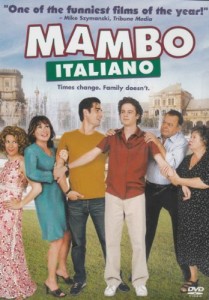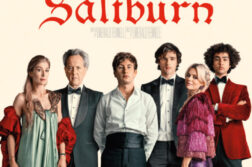 Mambo Italiano
Mambo Italiano
Directed by Émile Gaudreault
Cinémaginaire Inc. (Canada)
Equinox Films (Canada)
Stereotypes never really go out of style, although the PC police may take the heat off one group or another for a time. Amos ’n’ Andy is taken off the market but returns decades later as the Friday films. The Godfather comes back as The Sopranos. The mincing queers put down in the past become the heroes of The Birdcage.
Ever since My Big Fat Greek Wedding, Mediterranean-Americans, never completely out of fashion, have been back in vogue. Their latest incarnation is in the Italian-Canadian families of Mambo Italiano, which also features the new gay stereotype: call it non-stereotypical gays. One bit of dialogue may be a subtle acknowledgment of the film whose success got this one greenlighted. An interviewer asks Angelo Barber ini (played by Luke Kirby), “What inspired you to write this television show about the Italian community?” and he replies, “I don’t know—the Greek community?”
ini (played by Luke Kirby), “What inspired you to write this television show about the Italian community?” and he replies, “I don’t know—the Greek community?”
The best humor in Mambo Italiano is the most stereotypical, especially a scene in which Angelo’s parents, Gino and Maria, react to a wedding invitation they’ve received. We’re told at the beginning that Gino has been unhappy since he found out there are two Americas and he came from Italy to the wrong one: “the fake one, Canada.”
Steve Galluccio adapted his play, along with director Émile Gaudreault, so it’s fair to assume that he has a lot in common with Angelo, the wannabe TV writer. When we meet Angelo he’s calling the Gay Helpline to explain his situation, including the fact that—as Italians will do—he still lived at home until he was 27: “We leave the house only two ways, married or dead.”
Angelo has defied tradition by picking a third way: getting his own apartment. On the day that his parents and sister Anna visit, the apartment has been robbed. One of the policemen who respond to his call is Nino Paventi (Peter Miller, who looks like a lost Baldwin brother), who had once been Angelo’s inseparable friend. Their friendship ended back in high school, where Angelo was picked on as a “fag” and Nino became ashamed to be seen with him.
Now that they’re together again the guys take their friendship to the next level while on a camping trip, and soon Nino is moving in with Angelo. It is Angelo who decides that it’s time to come out of the closet, even though Nino clearly isn’t ready. To say that Angelo’s parents don’t take the news well would be like saying that the Titanic didn’t take well to being struck by an iceberg.
It’s hard for only one half of a couple to come out, especially in a world in which everyone knows everyone else, and so a panicked Nino starts exploring his sexual options with a woman, Pina, who had gone to high school with the guys and remembers Angelo as “the fag.” Nino’s flamboyant mother Lina hopes to “cure” her son by hooking him up with Anna: “If he can go for the brother he can go for the sister.” The inseparable mates go their separate ways for a time. Angelo is comfortable with being gay but doesn’t relate to the bar scene or to life in Montreal’s “gay village.” Will he get over Nino, or will they get together again? Will the Barberinis eventually rally behind their son?
With its limited budget for music rights, Mambo Italiano doesn’t even use the title song. Other Italian pop oldies are heard (but not the Dean Martin versions). The “mambo” is used near the end as a metaphor for social progress, the symbol of a family member too highly evolved to live.
Mambo Italiano could be dismissed as a formulaic feel-good movie that relies too heavily on stereotypes, but it’s got more going for it than that. All pasta sauces use the same ingredients, but some cooks put them together a little better than others.
Steve Warren, a freelance writer based in Atlanta, has been writing for the gay press for thirty years.





